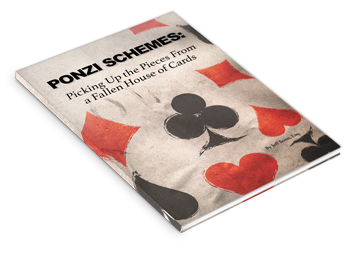The Securities and Exchange Commission today announced charges against Michael J. French, of Pendleton, South Carolina, and two companies controlled by him, MJF Holdings, LLC[...]
Ponzi Schemes
Ponzi schemes are a type of fraud involving the payment of dividends to investors from the money put in by subsequent investors. The money is usually not invested at all, but is often used by the person who started the scheme for personal expenditures. Perhaps the best known Ponzi scheme in recent history was run by Bernie Madoff.
The lure of Ponzi schemes is typically the promise of unusually high or regular returns. By the time most have been discovered, the investors’ money has already been spent, and getting it back can be extremely difficult. If you have lost money in a Ponzi scheme or fear that you may have been drawn into one, you should seek the advice of a Ponzi scheme lawyer immediately.
The purpose of this guide is to give you a general overview of some of the more famous Ponzi schemes, third parties who may be subject to liability for promoting these schemes, receiverships, collection issues, and some tips on where we might look to help victims recover their investment.
Real Estate Ponzi Scheme Overview A Ponzi scheme is a type of investment fraud that attracts investors with unusually high rates of return. The fraud[...]
Steps to Take When Reporting a Ponzi Scheme As explained by the Securities and Exchange Commission (SEC), a Ponzi scheme is a form of investment[...]
Often, people use the terms ‘Ponzi scheme’ and ‘pyramid scheme’ interchangeably. This is certainly understandable, as these two forms of investment fraud share key features.[...]
Below I’ve examined 10 of the most infamous examples of ponzi schemes from recent U.S. history. [Related: What is a Ponzi Scheme?] 1. Louis J.[...]
All too often, investors are duped into making an investment that promises extraordinary returns, later discovered to be a “Ponzi Scheme”.1 The term Ponzi Scheme[...]
The Structure of a Ponzi Scheme Ponzi schemes come in many forms, but usually contain the same type of structure. First, the promoter sets up[...]
Theories of liability in Ponzi cases normally include a claim for the sale of unregistered securities.1 The Securities Act of 1933 and the Securities Exchange[...]
Understanding the Uniform Fraudulent Transfer Act (UFTA) It is fairly common, upon discovery of a Ponzi scheme, for a Court to appoint a receiver to[...]
As noted earlier, it is common for the SEC to seek a receiver in Ponzi scheme cases, because there are often the fraudulent sale of[...]

